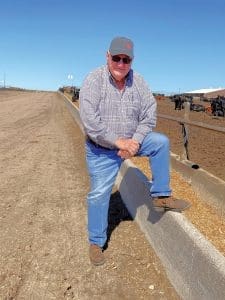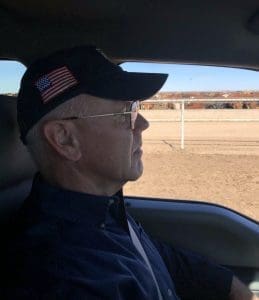If Beef Producers Want to Do Something About Fake Meat, Beef Producers Need to Step Up
By Burt Rutherford, Contributing Editor
What we’re doing here is a call to arms for everybody to start waking up. Start waking up our associations and start waking up beef producers.” That’s Andrew Timmerman’s take on the current state of the beef business as he watches synthetic meat make inroads into the real beef market.
Timmerman, owner of the Timmerman Feeding Company feedyard near Sterling, Colo., got his wake-up call one morning driving to work. The news announced that Colorado’s Gov. Polis had declared March 20 as Meat-Out Day in the state.
That hit hard. And that’s when Timmerman decided to hit back. His counter punches are two billboards now on display in Denver and Fort Collins, two rapidly growing cities along Colorado’s Front Range that are home to millions of Generation X, Y and Zers – those born since 1965. The message to consumers is simple – real beef is real; fake beef is fake. The message to his fellow beef producers is equally as simple – it’s time to step up.
“We’re not really defending ourselves against synthetic meat,” he says. “And it’s our job as an industry to tell them the truth. I see probably two synthetic meat commercials a night when I’m watching TV.” That’s compared to very little consumer-facing beef ads.
Lest beef producers think fake meat is just a passing fad, Timmerman points to the grocery store dairy case and the amount of fake dairy there. One of his feedyard customers is a developer and almond grower in California. Timmerman told him that with all the promotion of almond milk, the almond business must be really good.
His customer replied that almond milk has had no impact on almond prices. That’s because there are just enough almonds in there to call it “almond milk.” The rest is water and chemicals.
“I don’t want to go the way of the milk business,” he says. “When they came out with that synthetic milk, they [dairy producers] didn’t stick up for themselves.”
Fighting Back
In addition to launching his billboard project, Timmerman also was the driving force behind 10 food trucks serving beef at the state capitol on March 20, thanks to donations from farmers and ranchers. “We fed 1,250 people. A lot of people asked us a lot of good questions. And we answered them truthfully. And they were astounded.”
What’s more, three Denver TV stations covered the event. “They gave a fair representation of what we’re doing against the vegetarians and vegans and the plant-based food. Pretty much what we said came across – let the consumer decide instead of letting the government dictate.”
Timmerman says that by and large, beef producers don’t introduce themselves to consumers. “We need to get to these urban areas because everybody is so far removed from their food anymore that they don’t understand it,” he says. “And I get it myself. I concentrate on my business and trying to make the best product in the world. But we forget about the whole picture out there.”
And lest you fear that getting closer to your consumer opens you up to attack as the big, bad polluter who is destroying the planet, consider this story: “My father and uncle went to Harvard because a good friend is a Harvard professor” who invited the pair to visit with a group of students.
However, his father and uncle were hesitant to accept the invitation, fearing they were going to walk into a hostile environment. “They said the students were very receptive. They were uneducated on what exactly the beef industry does, compared to what they read on the internet.”
Billboard Battling
Advertising on TV costs money. A lot of money. The fake meat companies have that advantage because they have multi-billionaires investing in their business.
But beef producers have what the fake meat companies and their billionaires can only wish for, and that’s sure-enough, down-to-earth, dirt-on-their-boots credibility. That’s what Timmerman is drawing on with his billboard project and his challenge to fellow beef producers to get closer to their consumer.
The billboards now on display in Colorado will be up for a year. The law dictates that a billboard must be sponsored by a legitimate organization and Timmerman wants them to be an industry-wide effort, not just his feedyard.
The funds to pay for the billboards come from donations from individuals, be they farmers, ranchers or others who wish to get the truth about fake meats out to the folks who need to hear it. Because the Colorado CattleWomen agrees with that sentiment, the association became the initial sponsoring organization.
Future plans call for billboards to be erected in New York City, San Francisco and Los Angeles. To that end, Timmerman has formed America’s Farmers and Ranchers Organization. That will become the sponsoring organization and the collection point for all donations made to fund the billboard project. It will simply serve as a holding account for the money with 100 percent going to the project, nothing withheld. It will be dollars in, dollars out to produce the billboards and lease the space.
“We’re seeing promotion toward the people in the industry,” he says. But those don’t reach consumers. “I want to see them when I go to New York and California.”
And the message those consumers need to hear is that beef is a better, healthier, more sustainable food than a concoction of chemicals and compounds made in a factory. “We’ve got to show the benefits of our product vs. their product.”
Much of the false information being lobbed at beef producers is based on old or scientifically disproven information, such as that found in Livestock’s Long Shadow, an old publication from the United Nations that disparages beef.
“We’ve come a long way in how we produce beef. Our efficiencies, our humane handling are far and above what they’ve ever been. It’s just day and night from what it was even 20 years ago,” he says.
That’s the story beef producers need to tell. However, it’s not unlike two good ‘ol boys sitting on bar stools. “We can sit in the bar and solve all the world’s problems. But as soon as we walk out of the bar, that’s where it stays. We feel better talking about it, but there’s no action behind it,” he says.
“We’ve got to wake up and start getting active toward our business. We can’t keep that arrogance that beef’s been around for hundreds of years [and people will always eat it],” he declares. “We’ve got to start getting proactive in our business and start contradicting a lot of this stuff. Or we’ll wake up some day and see half the shelves in the supermarkets full of synthetic beef and half the shelves with real beef. They could take half our market.”







